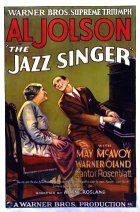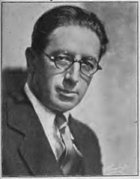
The Jazz Singer Page #6
- UNRATED
- Year:
- 1927
- 88 min
- 1,327 Views
TITLE 34:
"Well, I'm going to tell Berg about him -- witha voice like that --"
Buster comes up as she is talking. He shakes hands with Mary and
Estelle, and Thorpe is introduced. As they shake hands, Estelle spots
Jack and tells Buster to ask Jack over. Buster waves his hand and sits
down.
132.CLOSE-UP JACK
He sees the signal and jumps up eagerly. Then with an effort to slow
down in order to hide his eagerness to meet Mary, he walks slowly over
to the table.
133.CLOSE SHOT MARY'S TABLE
Buster is telling them about Jack, when the latter appears. Buster
presents him, and Mary asks him to sit down in the chair next to her. He
does so. Mary turns to him and asks him something about himself, first
congratulating him on his singing.
134.FULL SHOT ROOM
Frank goes to the piano and starts a dance number. The couples flock out
to the little dancing space. Thorpe asks Estelle to dance and she gets
up. Mary and Jack are deep in conversation.
135.CLOSE SHOT MARY'S TABLE
As Estelle and her escort move away in the dance, Buster looks at Jack
and starts to say something. Neither pays any attention to him. He makes
a facetious excuse, then gets up. They never notice him leave.
136.FULL SHOT ROOM
Buster threads his way through the dancers and climbs up on the
platform. He goes over to Frank and sits down on the stool alongside of
him. Frank starts to talk to him while he is playing.
137.CLOSE-UP JACK AND MARY
Jack thanks her for her approval of his song. Then, after a moment of
embarrassment, Jack tells her that he has seen her act on the Orpheum.
He says:
TITLE 35:
"I caught your act in the Orpheum at Salt Lake-- I think you're great!"
He leans over toward her in a gesture of boyish enthusiasm rather than
one of forwardness. Mary smilingly acknowledges the compliment. She asks
him where he played in that city. Jack replies:
TITLE 36:
"Oh, I sang in a movie house there -- and I'vebeen two weeks getting here."
He pauses and looks at her in a sidelong glance to see if, knowing the
truth about him, she would regard him any differently. She gives him a
quick look of sympathy, then says:
TITLE 37:
"If you come over to the Orpheum tomorrow at2:
00, I'd like to introduce you to themanager."
Jack looks at her wonderingly. He has been buffeted about so much that
he has long since lost confidence in his own ability. He asks Mary
eagerly if she thinks he can make the grade there. The girl nods and
says:
TITLE 38:
"I think your voice would get you a long wayson the big time -- you sing jazz, but it's
different -- there's a tear in it."
Jack looks at her gratefully. He is close to a tear now himself. The
girl smiles at him in a purely impersonal manner as he reaches out his
hand toward hers in an impulsive gesture. Then he slowly withdraws it
without touching hers.
FADE OUT:
FADE IN:
138.INT. RABINOWITZ HOME
The cantor, much older and more feeble than when we last saw him, is
seated at the table in the living room. His beard is almost white and
the hair about his temples is white and thin. There are deep lines in
his face, but a look of resignation has taken the place of the
indomitable sternness that marked his appearance ten years before. At
his side is standing a little Jewish boy, Moey -- a youngster of about
ten -- a typical ghetto child of the underfed, frail build. He is
singing and the old man is nodding his head in time as he does so.
139.CLOSE SHOT BOTH
The cantor suddenly stops the boy. He tells him that he is singing it
wrong. He adds:
TITLE 39:
"You must sing it with a sigh -- like you arecrying out to your God."
He motions to him to sing it again. The boy tries it and is again
stopped, this time more impatiently by the cantor.
140.CLOSE-UP CANTOR
He looks at the boy and his mind seems to wander. There is a misty look
in his eyes as he says:
TITLE 40:
"I wish I had my Jakie here -- he could showyou how to sing it -- he had a voice like a
angel."
141.CLOSE SHOT BOTH
Moey looks up at him curiously. The old man has turned his eyes back
into the past and is oblivious to the boy's presence until Moey looks up
and says:
TITLE 41:
"He ran away from home, didn't he, your boy?"
Translation
Translate and read this script in other languages:
Select another language:
- - Select -
- 简体中文 (Chinese - Simplified)
- 繁體中文 (Chinese - Traditional)
- Español (Spanish)
- Esperanto (Esperanto)
- 日本語 (Japanese)
- Português (Portuguese)
- Deutsch (German)
- العربية (Arabic)
- Français (French)
- Русский (Russian)
- ಕನ್ನಡ (Kannada)
- 한국어 (Korean)
- עברית (Hebrew)
- Gaeilge (Irish)
- Українська (Ukrainian)
- اردو (Urdu)
- Magyar (Hungarian)
- मानक हिन्दी (Hindi)
- Indonesia (Indonesian)
- Italiano (Italian)
- தமிழ் (Tamil)
- Türkçe (Turkish)
- తెలుగు (Telugu)
- ภาษาไทย (Thai)
- Tiếng Việt (Vietnamese)
- Čeština (Czech)
- Polski (Polish)
- Bahasa Indonesia (Indonesian)
- Românește (Romanian)
- Nederlands (Dutch)
- Ελληνικά (Greek)
- Latinum (Latin)
- Svenska (Swedish)
- Dansk (Danish)
- Suomi (Finnish)
- فارسی (Persian)
- ייִדיש (Yiddish)
- հայերեն (Armenian)
- Norsk (Norwegian)
- English (English)
Citation
Use the citation below to add this screenplay to your bibliography:
Style:MLAChicagoAPA
"The Jazz Singer" Scripts.com. STANDS4 LLC, 2025. Web. 23 Feb. 2025. <https://www.scripts.com/script/the_jazz_singer_878>.







Discuss this script with the community:
Report Comment
We're doing our best to make sure our content is useful, accurate and safe.
If by any chance you spot an inappropriate comment while navigating through our website please use this form to let us know, and we'll take care of it shortly.
Attachment
You need to be logged in to favorite.
Log In